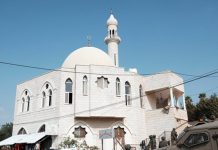Turkish air strikes in drought-struck north-east Syria have cut off access to electricity and water for more than a million people, in what experts say may be a violation of international law.
Turkey carried out more than 100 attacks between October 2019 and January 2024 on oil fields, gas facilities and power stations in the Kurdish-held Autonomous Administration of North and East Syria (AANES), according to data collated by the BBC World Service.
The attacks have added to the humanitarian crisis in a region reeling from a years-long civil war and four years of extreme drought exacerbated by climate change.
Water had already been scarce, but attacks on electricity infrastructure in October last year shut off power to the region’s main water station, in Alouk, and it has not been working since. On two visits there, the BBC witnessed people struggling to get water.
Turkey said it had targeted the “sources of income and capabilities” of Kurdish separatist groups it regards as terrorists.
It said that it was well known there was a drought in the area, adding that poor water management and neglected infrastructure had made things worse.
The AANES has previously accused Turkey of seeking to “destroy our people’s existence”.
More than a million people in the Hassakeh province who once got their water from Alouk now rely on deliveries of water pumped from around 12 miles (20km) away.
People living in the region have been caught up not only in Syria’s ongoing civil war but also in Turkey’s conflict with Kurdish-led forces, who established the AANES in 2018 after they – with support from the US-led coalition – drove the Islamic State (IS) group out of the region. Coalition forces are still stationed there to prevent a resurgence of IS.
Credit: bbc.com









